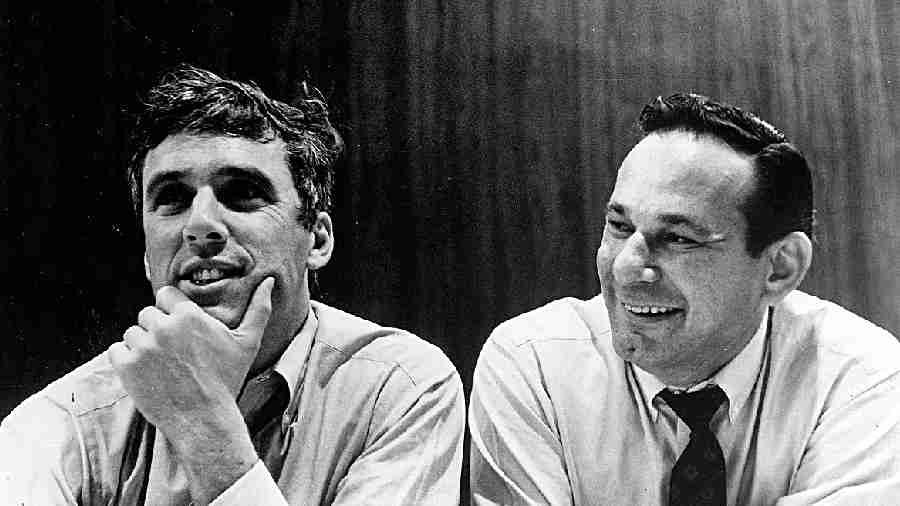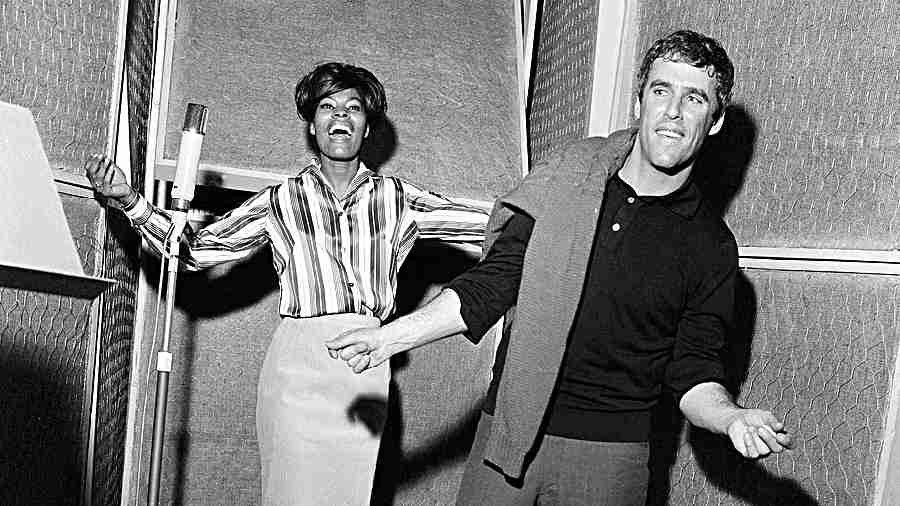In the 1960s when most composers and songwriters were either making easy-listening music for ageing musicians or working on songs that young musicians used to make a political statement, prolific songwriter Burt Bacharach engaged listeners with emotionally-charged titles, which became the alternate soundtrack of the era. The composer, who died at age 94 on Wednesday in Los Angeles, has left behind an enviable songbook.
Bacharach will be remembered for a playlist that includes songs like I Say a Little Prayer, Alfie and the Oscar-winning Raindrops Keep Fallin’ on My Head.
During the course of his long career, he scored 50 chart hits in the US and UK, working with artistes including Dionne Warwick, Frank Sinatra, The Beatles, Barbra Streisand, Tom Jones, Aretha Franklin and Elvis Costello. No wonder he won three Oscars, two Golden Globes and six competitive Grammy Awards, and was hailed as music’s “greatest living composer” when he accepted the Grammy lifetime achievement honour in 2008.
His music is full of romantic images and comes with brilliant harmonies and pop orchestration. Of course, this wouldn’t have been possible without his most frequent collaborator, the lyricist Hal David (who passed away in 2012). Even though they wrote most of their music during an era of social upheaval, their music remained mostly apolitical.
Though Bacharach collaborated with several lyricists over the years, his friendship with David, seven years his senior, was rock solid. The two had met in a music publisher’s office in 1957. For Bacharach, his high-profile career began in 1956 as the musical director, arranger and conductor for Marlene Dietrich but it’s his work with David that has gone down in history; they became a household name after co-writing a stunning series of catchy hits for Dionne Warwick.
TURNING POINT
Bacharach and David worked in the Brill Building, the famous music publishing hub, and they were often seen around young teams, like that of Carole King and Gerry Goffin or Barry Mann and Cynthia Weil. But the duo didn’t solely focus on the teenage market. Their sophisticated songs had a style that reminded one of Cole Porter.
The man himself was a regular on TV variety shows, conducting from the piano with confidence. The year 1964 was a milestone moment as Dionne Warwick recorded Walk on By and it became a number six pop hit. In a 2021 interview with The Wall Street Journal, he called it a career-turning point: “For the first time, I had given myself permission to use two fluegelhorns and two pianos. That led me to use five pianos on What’s New Pussycat? in 1965 with Tom Jones and a pair of fluegelhorns with Dionne on I Say a Little Prayer in ’67.”
Some of the songs he will be most remembered for are those that won him Academy Awards — Raindrops Keep Fallin’ on My Head (written with David) and Arthur’s Theme (Best That You Can Do) (written with Peter Allen, Carole Bayer Sager and Christopher Cross). Besides that, there is his original score for the 1969 film Butch Cassidy and the Sundance Kid, which included Raindrops (a massive hit for B.J. Thomas).
The Bacharach-David team took over Broadway in December 1968 with Promises, Promises. Adapted by Neil Simon from The Apartment, Promises, Promises was one of the first Broadway shows to use backup singers in the orchestra pit. It ran for 1,281 performances and gave Dionne Warwick the hit I’ll Never Fall in Love Again.

Burt Bacharach’s songwriting partner was Hal David
Bacharach’s music incorporated several genres, cool jazz to bossa nova and traditional pop. It was a style inspired by his tutor, French jazz musician Darius Milhaud. “His observation was: Never be ashamed of something that’s melodic, one could whistle,” Bacharach once said. “That was a valuable lesson I learned from him. Never forgot that one. Never be afraid of something that you can whistle.”

Bacharach and David worked extensively with the legendary Dionne Warwick
COLLABORATIONS WITH DIONNE WARWICK
The Bacharach-DavidWarwick combination deserves special mention. Beginning with Don’t Make Me Over in 1962, the duo offered a steady stream of hits for Warwick, among them Anyone Who Had a Heart, Walk On By, Alfie, I Say a Little Prayer and Do You Know the Way to San Jose. Warwick recorded over two dozen hits with the Bacharach-David team but then everything fell apart in 1973.
Warwick met Bacharach in 1961,while she was working as a session musician with her sister, Dee Dee Warwick, and aunt Cissy Houston. “Right from the first time I ever saw Dionne, I thought she had a special kind of grace and elegance that made her stand out. There was just something in the way she carried herself that caught my eye. To me, Dionne looked like she could be a star,” Bacharach wrote of their firstmeeting in his 2013 memoir, Anyone Who Had a Heart.
According to Variety, the trio had 33 hits reach the Billboard charts between 1962 and 1971, including seven that went to the Top 10. Shortly after recording the score for the movie musical Lost Horizon, the triumvirate split up acrimoniously and a flurry of lawsuits popped up. Looking back at his split with David in his autobiography, Bacharach acknowledged that “it was all my fault, and I can’t imagine how many great songs I could have written with Hal in the years we were apart”.
Bacharach made a comeback in the 1980s through his collaboration with the lyricist Carole Bayer Sager, whom he married in 1982. Their biggest hits were the Patti LaBelle-Michael McDonald duet OnMy Own and the AIDS fund-raising anthem That’s What Friends Are For. The latter was originally recorded by Rod Stewart for the soundtrack of Ron Howard’s 1982 movie Night Shift but was given a very different treatment by an allstar quartet billed as Dionne and Friends (Warwick, Stevie Wonder, Gladys Knight and Elton John). Bacharach and Sager divorced in 1991.
INSPIRING YOUNG MUSICIANS
Born in Missouri, Bacharach grew up in New York City, where he studied cello, drums and piano. He was hooked on the music of his heroes Dizzy Gillespie and Charlie Parker, and began playing in jazz bands of his own in the 1940s.
Bacharach remained an icon among singers like Adele, Sheryl Crow and Dr Dre. Oasis guitarist Noel Gallagher once admitted to lifting the chords for Half The World Away from Bacharach’s This Guy’s In Love With You.
The British singer-songwriter Elvis Costello worked with him on the ballad God Give Me Strength for the 1996 film Grace of My Heart and then came their album, Painted From Memory (1998), arranged and conducted by Bacharach. A song from that album, I Still Have That Other Girl, won a Grammy for best pop vocal collaboration.
“No matter what you put on a record, what effects you use, when you play it back you’d better have a melody. You’ve heard records, I’ve heard records you tire of after three days, they’re worn out. You need a melody to keep people coming back,” the legendary composer once said.
Hit after hit
- What’s New Pussycat?: It’s the song that Tom Jones keeps singing. “I thought, I’m going to punch the [stuffing] out of it on What’s New Pussycat. And Burt said, ‘That’s what I want. It’s a crazy song for a crazy film... I have to have a voice of authority’,” Jones has said.
- Baby It’s You: Written by Bacharach, Luther Dixon and Mack David about giving into the powers of love, the song recorded and released by girl group The Shirelles in 1961 and then by The Beatles.
- Raindrops Keep Fallin’ on My Head: Bacharach and Hal David won an Oscar for this song, after its use in the 1969 classic movie Butch Cassidy and the Sundance Kid.
- The Look of Love: A hit for Dusty Springfield, the sensual song featured in the 1967 spoof James Bond film Casino Royale, earning it a best song nomination at the following year’s Oscars.
- Walk on By: One of Dionne Warwick’s best-loved songs peaked at number six in the US in 1964. HIT AFTER HIT
- I’ll Never Fall in Love Again: Bacharach was in the hospital with pneumonia, which inspired his songwriting partner David to come up with the catchy line: What do you get when you kiss a girl?/You get enough germs to catch pneumonia/ After you do, she’ll never phone you.
- What The World Needs Now Is Love: Bacharach wrote in his autobiography that the simple waltz tempo pop hit contained some of the most difficult lyrics his partner David ever wrote, set against the backdrop of the Vietnam War.
- Close To You: Richard Chamberlain first recorded this Burt Bacharach and Hal David ballad in 1963, but it was not a hit until the Carpenters covered it in 1970.
- I Say a Little Prayer: One of Aretha Franklin’s most famous song, it was actually first recorded by Dionne Warwick.
- Anyone Who Had a Heart: Dionne Warwick was apparently unhappy with Cilla Black’s version beating hers in the UK, with Cilla later saying: “It was a number one; Dionne was dead choked and she’s never forgiven me to this day
